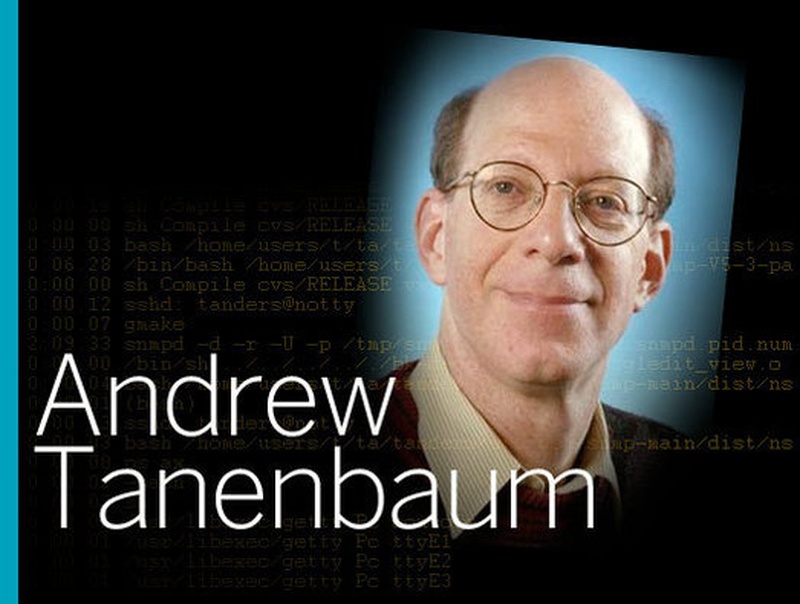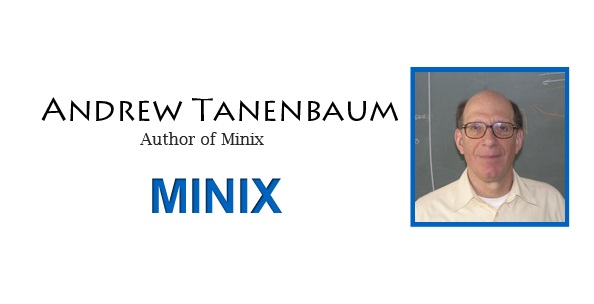Andrew S. Tanenbaum’s work and contributions | Famous IT Personalities
Andrew Stuart Tanenbaum is widely known for authoring “MINIX”, a clone of UNIX to teach his students and for his computer science books which are treated as bible in the subject. MINIX is a free operating system which has many features of UNIX. Tanenbaum is an American computer scientist and retired professor at the Vrije Universiteit, Amsterdam in the Netherlands.
For Tanenbaum, teaching is the most important work and he does it with full dedication. He handles Electoral-Vote.com which is the website used for analyzing polling data in the federal elections in the United States of America.
Andrew Stuart Tanenbaum As an Author
He is well known in the field of textbooks of computer science. There has been translation of his books in many different languages viz. Arabic, Basque, Bulgarian, Chinese, Dutch, French, German, Greek, Hebrew, Hungarian, Italian, Japanese, Korean, Macedonian, Mexican Spanish, Persian, Polish, Portuguese, Romanian, Russian, Serbian, and Spanish .
Universities round the globe use his books and there are as many as 175 editions so far for these books.
Andrew Stuart Tanenbaum’s famous books include:
- Computer Networks, co-authored with David J. Wetherall
- Operating Systems: Design and Implementation, co-authored with Albert Woodhull
- Modern Operating Systems
- Distributed Operating Systems
- Structured Computer Organization
- Distributed Systems: Principles and Paradigms, co-authored with Maarten van Steen
Amsterdam Compiler Kit
Tanenbaum was the architect of the Amsterdam Compiler Kit which is used for making portable compilers. The work was started around the year 1981. He played his role as the architect from the beginning of the production of this toolkit till its 5.5. Version.
Birth of MINIX
In the year 1987, when he wrote MINIX for IBM-PC, he wanted to show his students how does an operating system function? Therefore, he even wrote a book about it and put the source code of MINIX in the appendix of that book. A set of floppy disks were also made available containing the source code. The Usenet newsgroup comp.os.minix had reached more than 40,000 subscribers within a timespan of three months. All these subscribers discussed and tried to improve the system. Linus Torvalds, father of Linux, was also one of them.
MINIX still continues to be developed as an educational system as well apart from being a production system. The basis of the system is its microkernel and in the kernel mode, the system has just 5000 lines of code, the rest of the OS being run in user mode as a set of independent processes. The latest version of MINIX is called as MINIX 3 which is available as a free software under the BSD license.
Andrew Stuart Tanenbaum’s student list
Some of his Ph.D. students who have become prominent computer science researchers:
- Henri Bal, a professor at the Vrije Universiteit in Amsterdam
- Frans Kaashoek, a professor at MIT
- Sape Mullender, a researcher at Bell Labs
- Robbert van Renesse, a professor at Cornell University
- Leendert van Doorn, a fellow at the AMD Corporation
- Werner Vogels, the Chief Technology Officer at Amazon.com
Other works
Projects in which Tanenbaum has been involved include the following:
- Amoeba
- Globe
- Mansion
- Orca
- Paramecium
- RFID Guardian
- Turtle F2F
Tanenbaum has another feather in his cap which is the Advanced School for Computing and Imaging (ASCI). He was the co-founder of this school and served as the first Dean of the school. Initially the aim of the school was to work on problems in advanced computer systems. These included parallel computing and image analysis and processing. Primarily the school consisted of members of faculty and Ph.D. students (about 200 in number collectively) from Vrije Universiteit, University of Amsterdam, Delft University of Technology, and Leiden University.
In 2005, the Royal Netherlands Academy of Arts and Sciences awarded Tanenbaum with an Academic Professorship. After that, he took up research as a full time work and left the position of Dean of the ASCI having served it for 12 years. Since then the school has been expanding by including researchers from a number of universities in The Netherlands, Belgium, and France.


